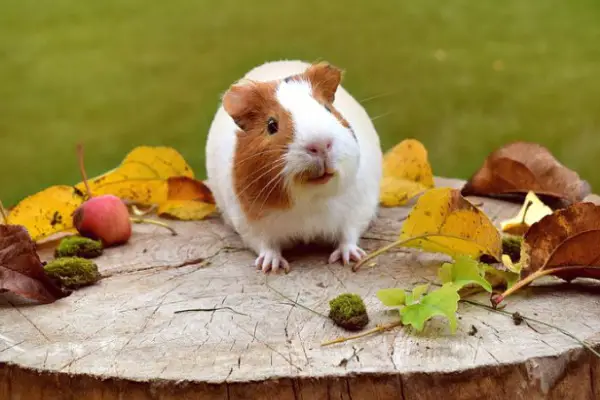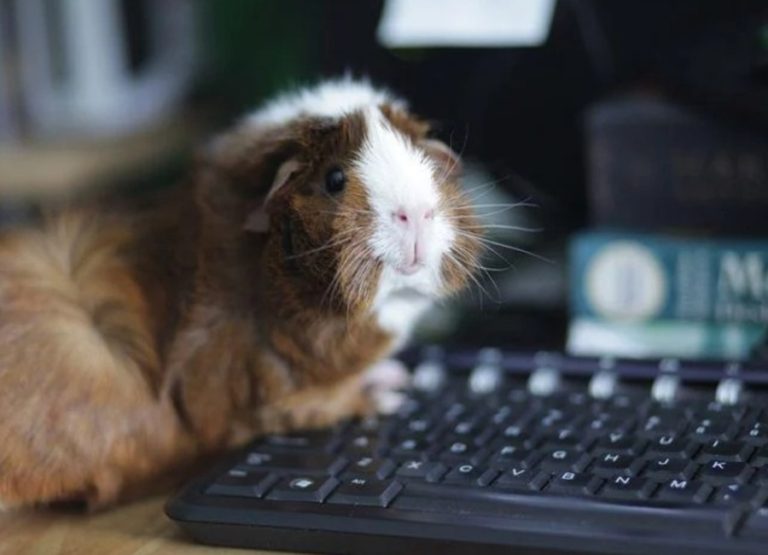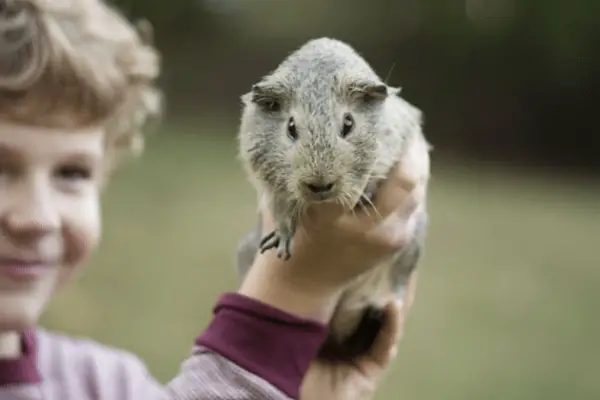14 Top Reasons Not To Get a Guinea Pig

There are lots of reasons not to get a guinea pig, which we will be discussing in this post. Having a pet comes with lots of benefits.
In this post, we will be discussing some of the most common reasons why you shouldn’t get a guinea pig as your pet.
This is not to discredit guinea pigs, but to point out what you should expect from owning one and to give you a heads-up.
Read more on some top reasons to get a guinea pig.
So…
Common reasons not to get a guinea pig
Here are some of the most common reasons why you shouldn’t get a guinea pig as a pet:
1. Guinea pigs are easily depressed if left alone
This is a big issue with owning a guinea pig, and one simple way to resolve it is getting them in pairs.
Getting guinea pigs in pairs is good because they are social animals, but this comes with its own cons.
Having two guinea pigs will definitely increase the cost of living financially and also will take up more of your time in caring for them.
In the wild, they dwell in small family groups of 5-10 guinea pigs, however, a colony may consist of many groups living in proximity.
So, if you are not in for more expenses and more time to care for a guinea pig, then look elsewhere.
2. Guinea pigs require high level of commitment
Since guinea pigs can live for about 5 to 8 years or even more, are you ready to keep up with all the care, feeding, and increased cost of living financially?
This is a long-time high level of commitment which you should know before thinking of getting one.
There are lots of guinea pigs in the shelter today just because owners neglect the level of commitment it takes to own a guinea pig.
Ask yourself where will you be in the next 5 to 7 years, will I be able to care for my guinea pig consistently over the years, can I fix the bills that come with owning one?
If you can then get one, if you can’t then back off and look elsewhere.
3. Guinea pigs require space for their cage
The small cages you see online are not the recommended size of cage that you will need to keep a guinea pig.
At least, you will need a 100 by 60 inches cage at a minimum which will take up some space in your house.
Guinea pigs require a large amount of area in which to run, play, and exercise their legs and muscles.
The more numbers of guinea pigs you have the more you require enough space, therefore, make sure you have enough space before thinking of getting a guinea pig.
4. Guinea pigs are sensitive to temperature changes
Guinea pigs are sensitive to temperature changes that they are prone to heatstroke.
This means they don’t do well in high temperatures or very low temperatures, they stay at temperatures close to humans.
Guinea pigs, however, are unable to adapt to unexpected temperature fluctuations. In fact, if a temperature shift of only a few degrees is too abrupt, they may die or get seriously ill.
Temperatures between 65 and 75 degrees Fahrenheit are good for guinea pigs (18-24 Celsius).
Guinea pigs can withstand cold better than heat, but they can easily become ill if the temperature varies by more than a few degrees.
5. Guinea pigs can mess everywhere up
It is best you know that you will be dealing with a lot of mess for the next 5 to 8 years or more before getting a guinea pig.
Guinea pigs don’t care, they just play and mess up their cage on a daily basis, while this is fun for some people it’s not easy for others.
You should be ready to invest in a good vacuum cleaner and also expect to see their fur in your clothes.
If you are not ready to do the work involved, please stay away and don’t get a guinea pig, and return them to the shelter home.
6. Guinea pigs are too dependent
Are you a traveler or some busy person who is always away most of the time, then guinea pigs are not for you!
Guinea pigs can’t care for themselves just like you expect when they are in the wild.
If you are going on vacation, or a business trip always then you will need a pet sitter and that will definitely cost you more money.
They need you for everything and can’t survive on their own while in captivity.
7. Guinea pigs require high cost of maintenance
Guinea pigs require fresh vegetables, especially in the winter, the cost of maintenance is normally high.
They require lots of hay, which is not found everywhere and is not always available.
You will also spend a lot on your guinea pig food, and if your guinea gets sick trust me you will spend more.
This means you always have to set aside some cash for any emergency, even getting pet insurance can be high.
8. Guinea pigs can be noisy sometimes
Be prepared to hear lots of sounds from your guinea pigs as they grow older, which may or may not be an issue to you.
Guinea pigs may be boisterous, which can be frustrating for you and cause disruption in your home.
Nothing is more aggravating than being awoken in the middle of the night by your young piggies playing or demanding to be fed.
These noises can be irritating, and they might also cause problems for others in your home.
9. Most guinea pigs are not interested in petting
If you are looking for a pet that needs constant petting or cuddling then guinea pigs are not for you.
Some guinea pigs allow you to pet them, while others will run away and don’t want you to touch them.
Even with proper taming this still happens from time to time.
10. Guinea pigs require intensive care
Guinea pigs require a lot of attention. Please don’t purchase a guinea pig if you aren’t willing to spend several hundred hours per year caring for it.
Their cages must be cleaned on a regular basis.
Removing dirty and damp bedding, washing the water bottle and feeding dish, and wiping off hard surfaces are all part of spot cleaning.
This will be repeated several times during the day.
Weekly comprehensive cleaning of the cage is also required.
Every week, every bone in the cage, as well as all the wood pieces or cardboard tubes they climb on, will have to be wiped clean.
Every day, your guinea pig should be let out of the cage, which means playtime and floor time are unavoidable.
As a result, it’s critical that you have both the time and the room to accomplish this, as well as secure their territory.
Every day, you must supply fresh fruit and vegetable scraps. Furthermore, cavies require an endless supply of hay.
In addition, you’ll spend a lot of time ensuring sure their hay is fresh and topping it up.
11. Guinea pigs are too wasteful
Guinea pigs don’t mind peeing on their food, and they are also picky with what they eat.
You can put new bedding by the time you come bad they have messed up the bedding, meaning you have to replace it.
Guinea pigs have a notorious reputation for being fussy eaters since they don’t adapt well to new meals.
It’s extremely possible that they’ll turn down a lot of the veggies you offer them at first and only eat them if they’re starving.
Guinea pigs are known to squander food, hay, and bedding, which may quickly mount up.
12. Guinea pigs can be prey for other pets
Guinea pigs don’t sit well with other pets, they are prey to other pets.
If you have a Siamese cat or a Bengal cat, then adding a guinea pig is a perfect recipe for failure.
This is not to say you can’t keep both pets, but you have to separate both and keep your guinea pig out of reach when you are gone.
Keep the piggies in their own area for the time being so they don’t have to interact with other pets.
Allow the piggies to run around in a room where your dog or cat cannot enter, and make sure you don’t look away.
Keep an eye on the piggies and the rest of your animals as they become accustomed to each other’s odors.
13. Guinea pigs are not good for kids under 4 years
Do you have a toddler, and you want a pet? Then guinea pig is not for you as kids below this age can’t properly handle them.
Guinea pigs aren’t the most kid-friendly animals. If you get one, you must realize that you, as the adult, will be responsible for the majority of the care.
For the most part, this isn’t necessarily a terrible thing. It’s simply something you must be aware of and accept.
14. Guinea pigs are faced with some health issues
Guinea pigs are more susceptible to a variety of diseases, some of which aren’t necessarily obvious to the human eye.
If you obtain a guinea pig, you should take it to the vet for a checkup to ensure that your guinea pig is in good health.
Here are the most common health issues associated with guinea pigs:
- Diarrhea.
- Scurvy.
- Parasites and Skin Problems.
- Respiratory Infections.
- Urinary Problems.
- Abscesses.
- Tumors
- Pododermatitisor bumblefoot.
- Barbering.
With the information provided on this page, I hope your concerns about Reasons Not To Get a Guinea Pig was resolved.



![Can Guinea Pigs Eat Watermelon [Answered] can guinea pigs eat watermelon](https://petcreeks.com/wp-content/uploads/2022/04/can-guinea-pigs-eat-watermelon.jpg)
![Can Guinea Pigs Eat Bananas [Helpful Tips] Can Guinea Pigs Eat Bananas](https://petcreeks.com/wp-content/uploads/2022/04/Can-Guinea-Pigs-Eat-Bananas-768x614.jpg)
![Can Guinea Pigs Eat Cucumber [Pros & Cons] Can Guinea Pigs Eat Cucumber](https://petcreeks.com/wp-content/uploads/2022/04/Can-Guinea-Pigs-Eat-Cucumber-768x614.jpg)
![Can Guinea Pigs Eat Apples [How To Feed] Can Guinea Pigs Eat Apples](https://petcreeks.com/wp-content/uploads/2022/04/Can-Guinea-Pigs-Eat-Apples.jpg)